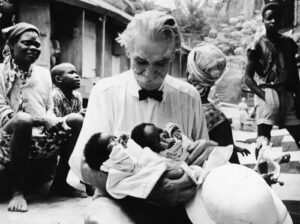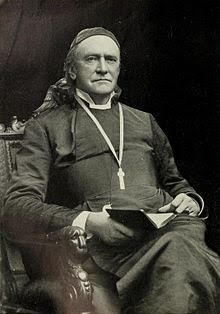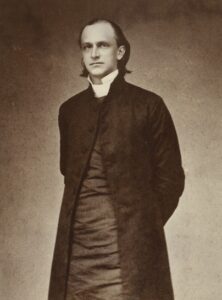Welcome to the Faithful Four! From an initial field of 32 saints, we are down to a holy four: Albert Schweitzer, Henry Whipple, Julian of Norwich, and Andrew the Fisherman.
Today it’s Albert vs. Henry. To get to the Faithful Four, Albert defeated Henry Mühlenberg, Thomas the Apostle, and Cornelius the Centurion. While Henry made it past Jackson Kemper, Clare of Assisi, and Canaire.
So, what happens in this round? Well, throughout Lent Madness, our saintly heroes have battled via basic bios, quirks and quotes, and even kitsch. In this round, we let our remaining Celebrity Bloggers loose as they answer the question “Why should Saint XX win the Golden Halo?” In other words, they’ve been charged with letting us know why their particular saint is so awesome. We have also invited them to share their two favorite images of their saints.
The Faithful Four continues today and tomorrow and then, on Spy Wednesday, 24 hours of voting begins to determine the winner of the 2024 Golden Halo.
The end is near! Vote now!
Over the years when I’ve made it to this round, I like to use it as an opportunity to reflect and think about what this saint means to me as a Christian. This year, the reflective process seems a little bittersweet as I plan to retire from Lent Madness and because I’m in a funny season of life that it is defined by change and transition. It makes me wonder what Albert would do.
And I keep coming back to what I wrote last round, “To be like Albert, you should dress like Albert, while you spend money on the poor. And while dressed like Albert and look like Albert and pray like Albert, you should care for the world like Albert, because the most important gift Albert left the world was love. He knew that if you sprinkled that care, compassion, intentional faith, walking in service to others in dark and ugly places, that’s where you will find true happiness, and consequently, where you will find God as well.”
 In the deepest and darkest places of my personal life, the moments where joy sparked again, were when I leaned into service of others. I think this is what Albert found as a missionary. Sure, like any Christian, Albert had his flaws. It’s easy to judge some of his words, actions, or choices from a modern perspective, but he’s also a polymath/genius that went to those places when others would have pursued greatness and fame, but he pursued people (and cats and dogs and music). When I think of Albert, I think of someone who was so in touch with the sound of God within that it came out in every encounter he had and from those encounters with people and music and writing was where joy, peace, happiness, and love bloomed. Albert didn’t seek out success, he sought out God through service and art and healing and consequently success just happened to follow. And I like to think he likely didn’t care about that success as his soul was fed from pursuit of the song God laid on his heart.
In the deepest and darkest places of my personal life, the moments where joy sparked again, were when I leaned into service of others. I think this is what Albert found as a missionary. Sure, like any Christian, Albert had his flaws. It’s easy to judge some of his words, actions, or choices from a modern perspective, but he’s also a polymath/genius that went to those places when others would have pursued greatness and fame, but he pursued people (and cats and dogs and music). When I think of Albert, I think of someone who was so in touch with the sound of God within that it came out in every encounter he had and from those encounters with people and music and writing was where joy, peace, happiness, and love bloomed. Albert didn’t seek out success, he sought out God through service and art and healing and consequently success just happened to follow. And I like to think he likely didn’t care about that success as his soul was fed from pursuit of the song God laid on his heart.
As I sit in my season of change, Albert reminds me of my dad. You’ve heard me write this in years’ past, but my dad always whispered to me, “Soft overcomes hard.” Albert once reflected, “constant kindness can accomplish much. As the sun makes ice melt, kindness causes misunderstanding, mistrust, and hostility to evaporate.” And so, these two men send me a message in this season and hopefully to you as well, that it’s never wrong to try and be a good human, to lean towards love, even when you don’t like nor understand; to turn to service of others, when your thoughts may be all on the self; and to pause when overwhelmed to enjoy a cat, a dog, some beautiful music and the softer things in life, so that the hardness in your heart may be soothed.
— Anna Fitch Courie
Henry Whipple
 At some point, I remember having a long conversation with my parents. A phrase from that conversation has stuck with me since then, especially since becoming a parent myself – in parenting, and in life, I was told, we only hope “to make the best choices we can with the information we have at the time.”
At some point, I remember having a long conversation with my parents. A phrase from that conversation has stuck with me since then, especially since becoming a parent myself – in parenting, and in life, I was told, we only hope “to make the best choices we can with the information we have at the time.”
That phrase has echoed in my head as I consider Henry Benjamin Whipple. We remember Bishop Whipple for being the first Bishop of the Diocese of Minnesota, and for the choices he made in the place he was called to serve. We recall his championing of the rights of indigenous people against the abuses and unkept promises of the Federal government, and for presiding at the ordination of the first Indigenous Episcopal priest, Enmegabowh.
Yet his legacy is complex. We want our saints to be without blemish, yet invariably, they are not; for they are human, and humans are sinful. Augustine was a philanderer; Jerome was cross and grumpy; Paul had a literal body count. Whipple was not without fault – he was by modern standards an assimilationist, believing that the best way to help indigenous people was to make them integrate them into the norms of white American Protestant Christian culture. He was often blind to the privilege he carried, and as such, his desire to share the good news of the gospel most likely didn’t always present itself as a truly free choice to those he was evangelizing – and force, whether implicit or explicit – is not of God.
 Yet I can still count him a saint. Because for all his flaws (and they were undoubtedly many), he made the best and most faithful decisions that lay within him with the information he had at the time. When Whipple made his pleas for clemency following the Dakota War of 1862, his public stance brought him scorn and derision of not only his neighbors, but even of many of his fellow bishops. He did it anyway. When the vast sway of public opinion called for genocide and murder, he used his privilege to speak against vengeance and for mercy – to speak for what he understood to be right. When it would have been easy, permissible, and even lauded to remain silent, Whipple spoke out.
Yet I can still count him a saint. Because for all his flaws (and they were undoubtedly many), he made the best and most faithful decisions that lay within him with the information he had at the time. When Whipple made his pleas for clemency following the Dakota War of 1862, his public stance brought him scorn and derision of not only his neighbors, but even of many of his fellow bishops. He did it anyway. When the vast sway of public opinion called for genocide and murder, he used his privilege to speak against vengeance and for mercy – to speak for what he understood to be right. When it would have been easy, permissible, and even lauded to remain silent, Whipple spoke out.
The saints, like Bishop Whipple, shine not for their perfection but because their choice to be faithful – each in their time and place – reveal to our eye a broader view of God’s redeeming purpose in our lives and world. For their moments of courage and faithfulness to the call of Jesus Christ, we give thanks; and for those moments in which human nature is transparently evident in their lives, we commend them to Jesus, knowing that what God cannot bless, God will always redeem.
Whipple chose to make the most correct and courageous decisions he could make from the place where he stood; it is for that courage and wisdom that we can give thanks and find hope.
— David Sibley
66 comments on “Albert Schweitzer vs. Henry Whipple”
Sigh. It looks like Bishop Whipple will not be moving on. If anyone wants to know more about The Rt. Rev. Henry Benjamin Whipple, I recommend reading the book Lincoln's Bishop by Gustav Niebuhr (see https://search.worldcat.org/title/857966850 to find it at a library near you or ask your local independent bookseller to order you a copy).
To Anna Fitch Courie: Thank you for your faithful service as a Lent Madness blogger/contributer. I very much appreciare your insights on Albert Schweitzer as his life has impacted yours. I am goung through a season of change and not-always-wulling acceptance of the consequences of the de isions that must be made to adjust to my present circumstances. When I find myself gravitating toward isolation, that's when God spurs me into some ser ice project or another, thereby short-circuiting my advance into depression. It has happened so often lately that I rejoice whrn God rexirects my steps, because his path provides a deeper peace and joy than I can find on my own!